Nato peacekeepers attacked by ethnic Serbs in Kosovo
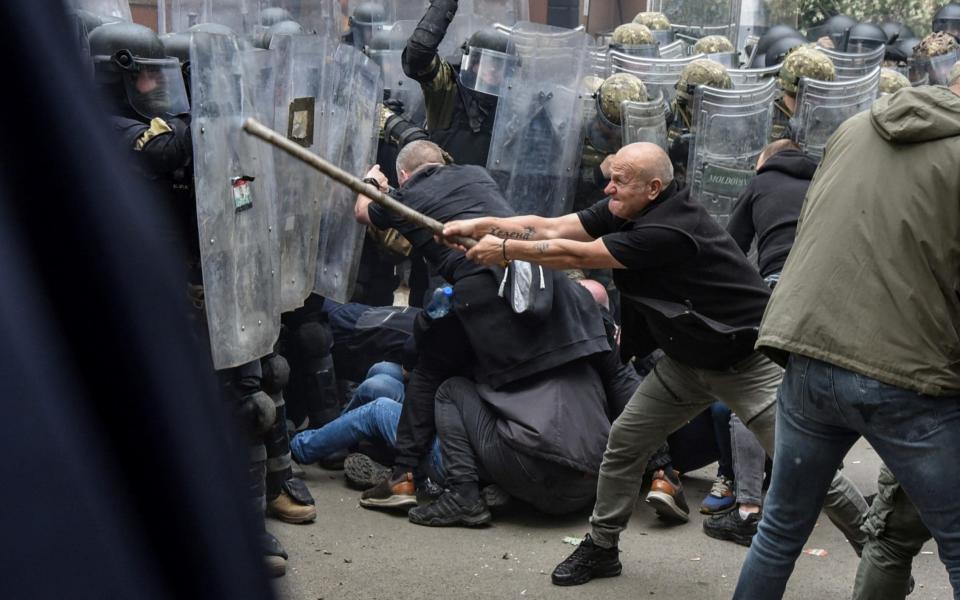
Dozens of Nato soldiers sustained “trauma wounds with fractures and burns” on Monday after they were attacked by ethnic Serb protesters in the powder keg north of Kosovo.
Between 25 and 40 peacekeepers from KFOR, the Nato-led peackeeping mission in Kosovo, were injured as they defended town halls in northern Kosovo as ethnic Serbs protested the installation of ethnic Albanian mayors.
The injuring of Hungarian and Italian peacekeepers would be “the first time in more than a decade that a KFOR soldier has been hurt in the line of duty,” said Jasmin Mujanovic, an expert on the Balkans.
Serbian President Aleksandar Vucic claimed 52 Serbs were hurt, three seriously, while one was "wounded with two gunshots by (ethnic) Albanian special forces".
Hungary's defence minister said on Facebook that "more than 20 Hungarian soldiers" were among the wounded, with seven in a serious but stable condition.
Video footage showed shaven-headed and hooded Serbian men using batons to beat the riot shields held by Nato troops in the town of Zvecan.
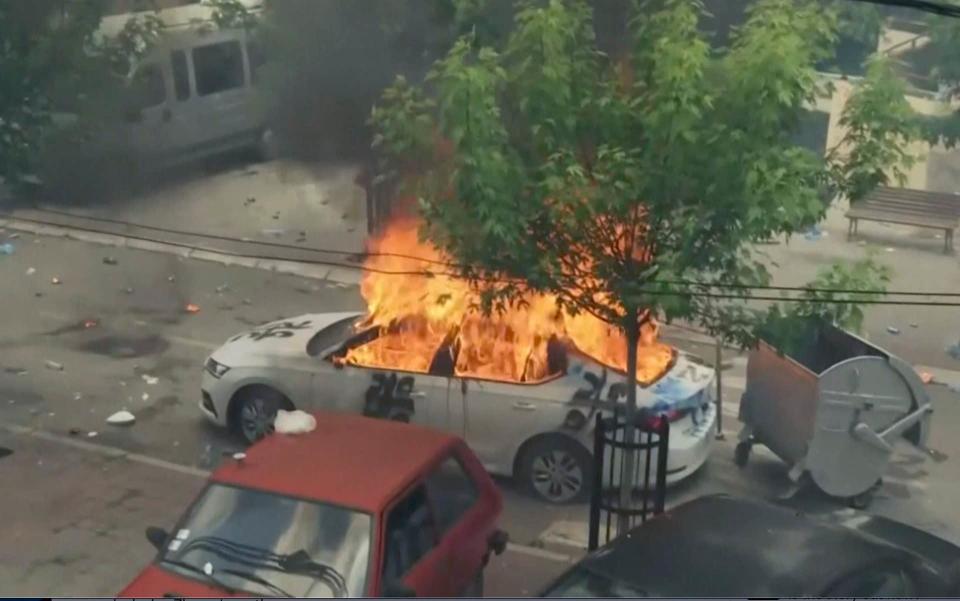
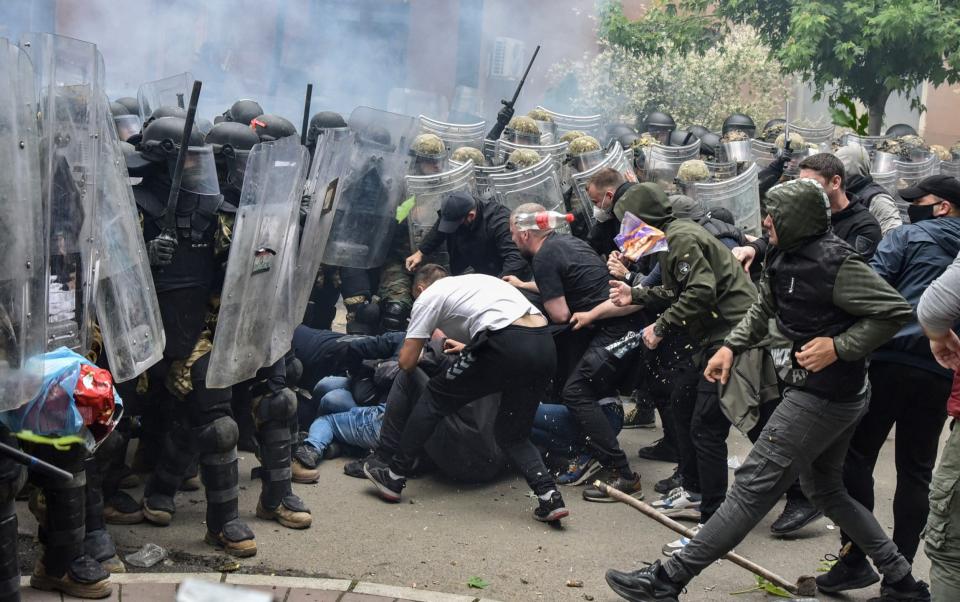
Ethnic Serbs in northern Kosovo still do not recognise Kosovo as a country and have the backing of neighbouring Serbia.
Months of acute tension between the two communities have culminated in violence in the last few days, and on Monday Nato soldiers, mostly Italians and Hungarians, came under attack from ethnic Serbs.
“While countering the most active fringes of the crowd, several soldiers of the Italian and Hungarian KFOR contingent were the subject of unprovoked attacks and sustained trauma wounds with fractures and burns due to the explosion of incendiary devices," KFOR said in a statement.
The commander of the KFOR mission “stressed that the unprovoked attacks are unacceptable.”
Eleven of the injured soldiers were reported to be Italian.
Three of them were reported to be in a serious but not life-threatening condition.
Antonio Tajani, Italy’s foreign minister, expressed concern for the wounded soldiers, while Guido Crosetto, the defence minister, wished them a “swift recovery”.
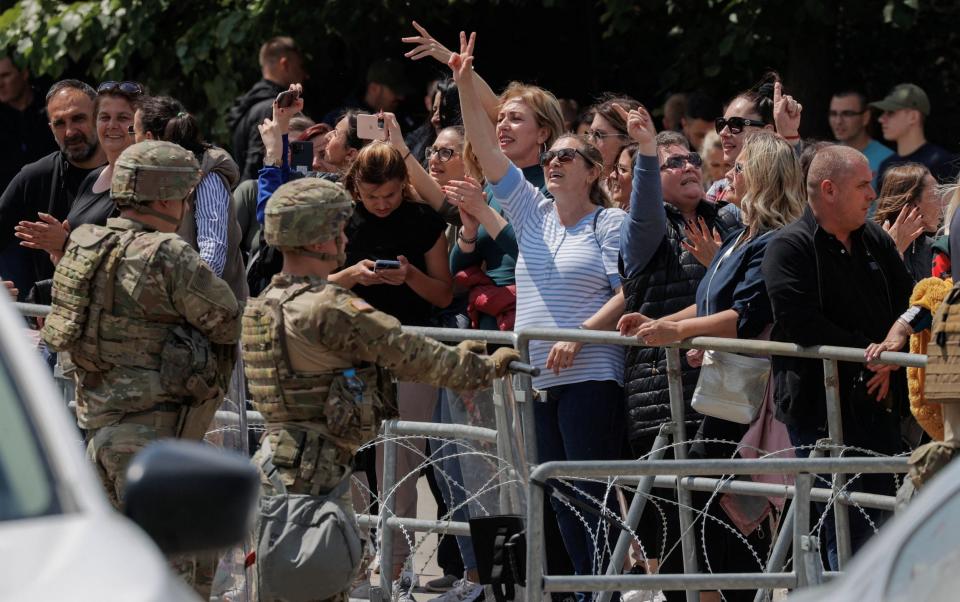

Vjosa Osmani, Kosovo’s president, accused her Serbian counterpart, Aleksandar Vucic, of destabilising Kosovo.
"Serb illegal structures turned into criminal gangs have attacked Kosovo police, KFOR (peacekeeping) officers & journalists. Those who carry out Vucic's orders to destabilise the north of Kosovo, must face justice," she tweeted.
The tense situation developed after ethnic Albanian mayors took office in northern Kosovo's Serb majority area after elections that ethnic Serbs boycotted.
In Zvecan, one of the towns, Kosovo police - staffed by ethnic Albanians after Serbs quit the force last year - sprayed pepper gas to repel a crowd of Serbs who broke through a security barricade and tried to force their way into the municipality building.
Serb protesters threw tear gas and stun grenades at Nato soldiers. They spray-painted Nato vehicles with the letter "Z", referring to a Russian emblem used in the war in Ukraine.
Igor Simic, deputy head of the Serb List, the biggest Belgrade-backed Kosovo Serb party, accused Albin Kurti, Kosovo’s prime minister, of fueling tensions in the north.
"We are interested in peace. Albanians who live here are interested in peace, and only he (Kurti) wants to make chaos," Mr Simic told reporters in Zvecan.

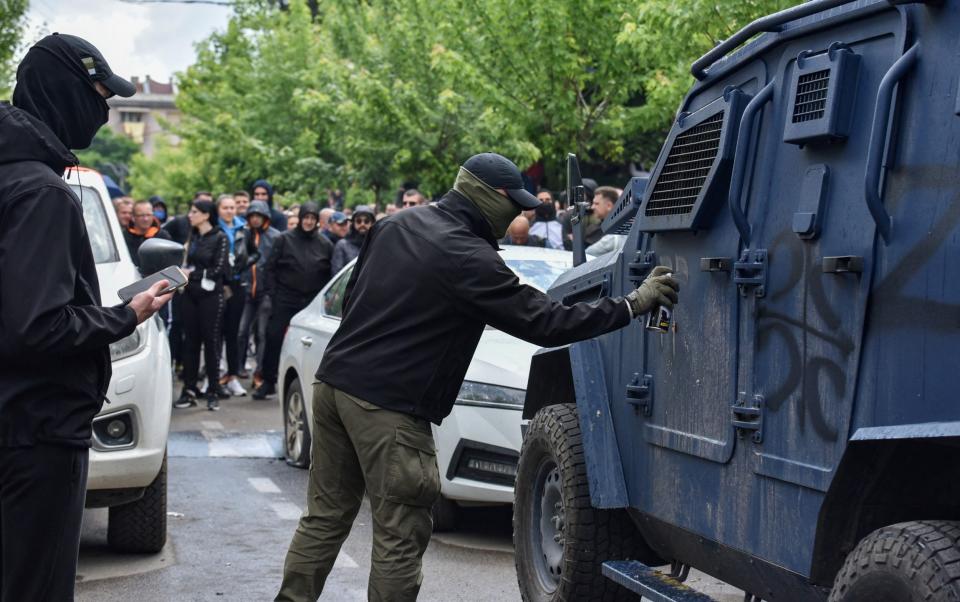
But Mr Kurti, the prime minister, condemned “ultra-nationalistic Serb graffiti on Nato vehicles”, saying it was a “dark reminder” of the Balkan wars.
Serbs, who comprise a majority in Kosovo's north, have never accepted its 2008 declaration of independence from Serbia.
They still see Belgrade as their capital more than two decades after the Kosovo Albanian uprising against repressive Serbian rule.
Ethnic Albanians make up more than 90 per cent of the population in Kosovo as a whole, but northern Serbs have long demanded the implementation of an EU-brokered 2013 deal for the creation of an association of autonomous municipalities in their area.
Serbs demand that the Kosovo government remove ethnic Albanian mayors from town halls and allow local administrations financed by Belgrade resume their work.
On Friday, three out of the four ethnic Albanian mayors were escorted into their offices by police, who were pelted with rocks and responded with tear gas and water cannon to disperse the protesters.

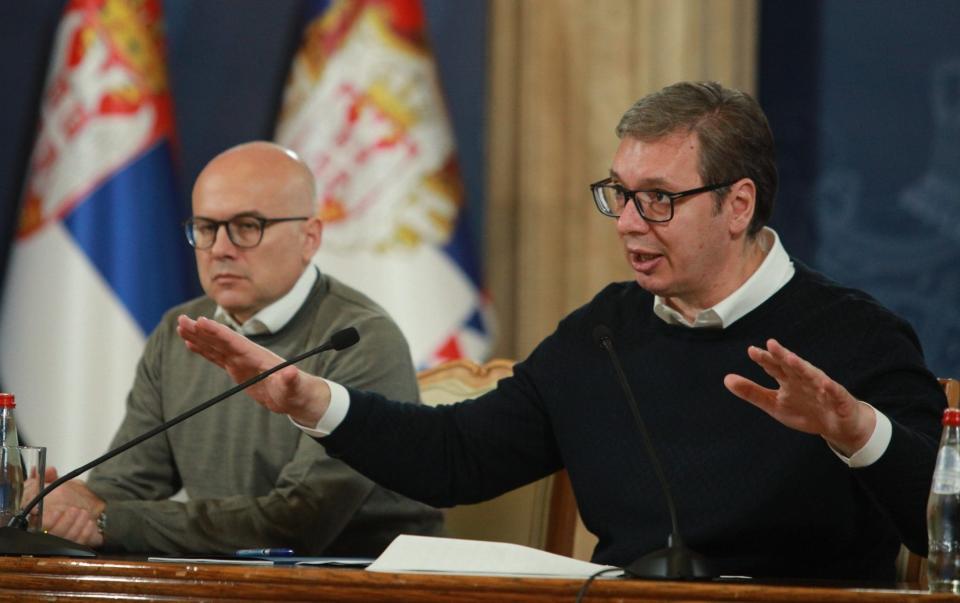
The United States and its allies, which have strongly backed Kosovo's independence, rebuked Pristina, saying imposing mayors in Serb-majority areas without popular support undercut efforts to normalise relations.
Ivica Dacic, the foreign minister of Serbia, said that it was "not possible to have mayors who have not been elected by Serbs in Serb-majority municipalities".
Carl Bildt, former Swedish prime minister and special envoy to the Balkans, said that the violence was “the worst that’s been seen in Kosovo in many years.
“Serb militants in northern Kosovo attack Nato forces...the cycle of escalation must be broken quickly.”
Mr Bildt said the government of Kosovo bore much of the responsibility for provoking the clashes.
“There is plenty of blame to go around for the new crisis in northern Kosovo but the first steps that started the cycle of escalation were taken by the Pristina side. Then it's been downhill from there. And now it's really bad.”
Jeffrey Hovenier, the American ambassador to Kosovo, said: “We are concerned about reports today about violence against official property. We've seen pictures of graffiti against KFOR cars and police cars, we've heard about attacks on journalists, we condemn that.”
Mr Mujanovic, the Balkans expert and a political scientist, wrote in a tweet: “(The) US ambassador confirms that explosives and/or incendiary devices were used against KFOR troops today in Kosovo.
“The continued use of the term ‘protesters’, though, is unfortunate, and suggests the US remains unwilling to accept it’s dealing with armed militant, directed by Belgrade.”
The Serbian president will meet on Tuesday with the ambassadors of the US, Russia, China, Britain and the head of the European Union mission, the president's office said late on Monday. Afterwards, Mr Vucic will conduct separate meetings with the ambassadors of Finland, Russia and China.
On Monday, Novak Djokovic, the tennis player, sparked controversy at the French Open for writing a political statement on a camera lens that appeared to deny Kosovo's independence.
Writing after his straight sets win over Aleksandar Kovacevic, the Serb wrote: "Kosovo is the heart of Serbia. Stop violence."

 Yahoo News
Yahoo News 